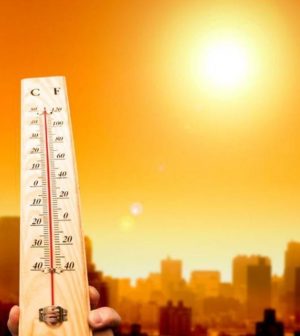- The Best Time of Day to Drink Bone Broth to Maximize Health Benefits
- 8 Ways to Increase Dopamine Naturally
- 7 Best Breads for Maintaining Stable Blood Sugar
- Gelatin vs. Collagen: Which is Best for Skin, Nails, and Joints?
- The Long-Term Effects of Daily Turmeric Supplements on Liver Health
- Could Your Grocery Store Meat Be Causing Recurring UTIs?
- Are You Making This Expensive Thermostat Error This Winter?
- Recognizing the Signs of Hypothyroidism
- 10 Strategies to Overcome Insomnia
- Could Artificial Sweeteners Be Aging the Brain Faster?
Soaring Temperatures Bring Heat Stroke Dangers

On sizzling hot summer days, it’s important to guard against heat exhaustion and heat stroke, an expert says.
“Heat stroke occurs when the core temperature of the body reaches 104 degrees Fahrenheit and changes in our central nervous system take place, such as disorientation, confusion, behavioral or emotional changes or altered mental status,” said Isabel Valdez, a physician assistant and assistant professor of general internal medicine at Baylor College of Medicine in Houston.
“In some case, seizures or comas can also occur. Vital internal organs like the brain, liver and kidneys can be damaged by heat stroke,” she said in a Baylor news release.
Heat stroke — which can be fatal if not treated immediately — may occur if signs of heat exhaustion are ignored. They include sweating, rapid heart rate, lightheadedness, headache, low blood pressure, muscle cramps, nausea, vomiting or diarrhea.
If heat exhaustion is suspected, find a place to rest, drink water and move to a cooler setting. If a person becomes confused and has an elevated body temperature of greater than 104 degrees, they require emergency care, Valdez advised.
One way to prevent heat exhaustion is to drink water early in the day and while in the heat.
“Fluids with electrolytes are very helpful but not necessary,” Valdez said. “If you are going to be outdoors for extended periods, acclimatize yourself to the heat by spending only a few hours outdoors at first and adding more time in the outdoors over a span of two weeks.”
High humidity may contribute to heat exhaustion, so wear cool clothing and take breaks from the heat.
Those most at risk for heat exhaustion include children, the elderly, overweight people and young athletes, especially football players who wear heavy equipment.
Some common over-the-counter and prescription medications such as antihistamines, diuretics, anticonvulsants and antidepressants may increase the risk of heat exhaustion.
“If you have to work or train in the outdoors and are concerned for the risk of heat exhaustion, reach out to your medical provider to review your medications and create a plan that suits your needs to keep you healthy during the heat,” Valdez said.
More information
The American Academy of Family Physicians has more on heat exhaustion and heat stroke.
SOURCE: Baylor College of Medicine, news release, June 28, 2021
Source: HealthDay
Copyright © 2026 HealthDay. All rights reserved.










